The Wisdom Buddha Protector of Je Tsongkhapa's Tradition
Spiritual Lineage
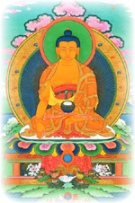
Buddha
Shakyamuni
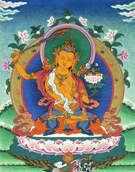
Buddha
Manjushri

Je Tsongkhapa
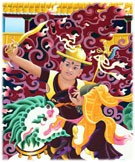 Wisdom Buddha
Wisdom Buddha
Dorje Shugden
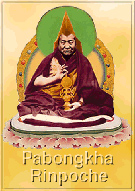
Pabongkha Rinpoche
(1878-1941)
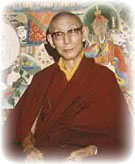
Trijang Rinpoche
(1901-1981)
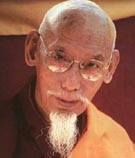
Song Rinpoche
(1904-1984)
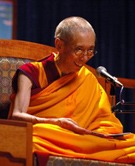
Geshe Kelsang Gyatso
(born 1931)
Letters from Dorje Shugden Devotees
"As long as there is disregard and violation of human rights and religious freedom within our own community by our own leaders, there is no solving of the Tibetan problem on the international level."
"We would also like to state, that we do not pursue any political aims, that we neither support the Chinese policy towards Tibet, nor any impairing of the Olympic games 2008."
1. Why we needed to come into existence
2. Our problem is a most serious religious prosecution with violation of basic human rights
Why we needed to come into existence
Dorje Shugden Devotees Charitable & Religious Society, Delhi, February 2008
"Our organisation has no financial, political, or sectarian objectives of any kind. It is our innermost sincere wish to maintain a wholesome and harmonious relationship with all beings, with all religions, and in particular with all fellow Buddhists, regardless of their traditions."
"Our organisation, with deepest respect to all our masters of the past and the present, shares full sympathy with all those courageous monks and people, who have unbelievably become a victim of injustice and discrimination without transgression of the slightest precept of the Dharma and rules of the world. We hope this meaningless dissension will soon be brought to an end in a just manner, fully in accordance with the principles of the Dharma and the code of society. We also place our hope and full confidence in the unbiased judgement of the law and the people of this great nation of India, as well as the entire free world."
Dorje Shugden is the name of a Buddhist Dharma-protecting deity.
One may wonder about the reasons for calling an organisation with the name of a deity. It is a bizarre and unprecedented incident in the Tibetan exile community in connection with this deity that led to the founding of our society.
In Tibet and the first decade in exile the Dalai Lama used to regard this deity as a benevolent, reliable, and efficiently helpful protector in times of need. In an unimaginable change of attitude, the Dalai Lama turned to regarding the very same deity as most harmful demon, endangering his very life, and responsible for everything that goes wrong about Tibet.
With the Dalai Lamas' displeasure being deliberately kept in growth for 20 years by some in his close circle, it finally culminated in public denouncement of the deity and its devotees on March 1996 during the spring session of public teachings at Dharamsala with most blunt phrases like: "If you people want me to be damned and do not care about Tibetan freedom, you go ahead worshipping that evil spirit."
This provocation immediately triggered an unprecedented discord in the Tibetan community. After that very teaching-session two young nuns from the Tibetan Gelug nunnery in Dharamsala took first action to destroy a holy statue of this very deity in their own temple, by tearing the earthen image filled with many dharanis and sacred blessings received from the Dalai Lama and his two most venerable tutors to ground, stamping on it and throwing it in the garbage.
This was the starting point of a massive, worldwide campaign against this deity and its devotees, conducted by the exiled Tibetan government. Although this government claims to represent a democratic system on the base of a democratic constitution, which in its original version assures its subjects all the human rights including the right of faith, the denouncement by the Dalai Lama was immediately followed by the exile government taking this issue as a most important policy, which was implemented by calling for signature campaigns in the monasteries and communities worshipping this deity.
In 1996 representatives of the government were sent to the three great Gelug monasteries, Sera, Drepung, and Ganden in South India, and created there a tense and suspicious atmosphere, similar to the public accusation meetings conducted by the Chinese in Tibet during the cultural revolution. All the monks were called for meetings in their temples and were forced to choose between the Dalai Lama or the deity Dorje Shugden. Many out of sheer anxiety and respect for the Dalai Lama gave their signature in favour of him. Others, who were more thoughtful, showed their reluctance and withdrew from signing, some declaring such a choice to be as impossible as a choice between one's two parents or one's two eyes.
However, those declining the signature found themselves labelled as traitors and anti-Dalai-Lama-individuals from the very next day on. From then on up until now this campaign for the annihilation of the name of Dorje Shugden has continued in constantly increasing ardour year by year, with destruction of texts and holy images of the deity in many places.
Absurdly enough, in this frenzy of destruction it was sometimes the 'wrong' image that got extinguished, and even the Dalai Lama once had to excuse himself after giving a heavy scolding at Sera Me monastery about a small painting, he thought to depict Dorje Shugden, while it was 'just' an image of another one of many deities looking similar. There are a number of protecting deities wearing a golden hat and riding on a lion.
In such a desperate situation the creation of our organisation became indispensable. Of course, it is not our aim to save the enlightened deity from any harm, but our aim is to help many thousands of people from becoming a victim of discrimination, injustice, and deprivation of their basic human rights.
Moreover, all the profound religious practices related to this deity have been bestowed upon us, along with the precious transmissions of all aspects of the Buddha's teachings by our great masters, such as His Holiness Kyabje Trijang Dorje Chang, one of the two great tutors of the Dalai Lama, to whose kindness all Tibetans of our time are immeasurably indebted. In order that these masters' valuable contributions for the Dharma and the sentient beings may not be misjudged, distorted, or erased, it was agreed by the devotees of Dorje Shugden in India, Nepal, and abroad, to establish this society. Our organisation has no financial, political, or sectarian objectives of any kind. It is our innermost sincere wish to maintain a wholesome and harmonious relationship with all beings, with all religions, and in particular with all fellow Buddhists, regardless of their traditions.
Since the founding of this organisation, with all sincerity and great hope, have we presented appeals to the Dalai Lama and the concerned offices, humbly requesting consideration for our situation, and to allow us to continue our prayers and devotions as in the past generations and centuries. Our organisation, as well as other individuals and groups, such as the council of Gelug teachers in Europe, have also requested audiences with the Dalai Lama in hope for a dialogue on this issue. However, to everybody's great disappointment, such requests were harshly turned down, as if our persons and petitions were completely unworthy of any attention.
We have also approached the dignitaries of our own monasteries for their mediation. While many of them were deeply worried about the situation, none had the courage to challenge the infallibility of our Dharamsala administration, the exile government. Very sadly we also had to notice that many were more concerned about their positions and careers than the destiny of the actual practice of the Dharma.
Some concerned abbots tried their best to downplay this issue in their monasteries, which reduced escalation temporarily. At a meeting we had organised in Delhi, abbots of Sera, Drepung, and Ganden have agreed to request an audience with the Dalai Lama to discuss the issue. But it was denied like all other requests. Thus every genuine effort of solving this problem in an open, wise, and honest manner, before it escalated to the present level, was turned down.
The Dalai Lama continued his antagonism towards the deity, fuelled by ill-intending informants in the guise of oracles, disciples, and favourites, and expanded the campaign against Dorje Shugden worldwide. Almost in all the public teachings of the Dalai Lama in the East and the West he raised this point and vehemently blamed the deity and its adherents.
Thousands of Tibetans, against their own will, are banned from attending his teachings and initiations on the ground of lacking "pure samaya" (spiritual bonds), while non-Buddhists and atheists are most welcome.
Many Buddhists abroad, who came to the speeches of the Dalai Lama, generally containing the message of peace, tolerance, oecumenical dialogue, and universal responsibility, met with a disappointing surprise in the concluding session, which mostly contained the statements on Dorje Shugden. This is indeed deeply regrettable at a time of international recognition of the Dalai Lama and the spreading of his holy name.
Moreover, it is most heartbreaking that the Tibetan administration has used all their misplaced methods and efficiency to transport this unfortunate problem back to our homeland Tibet. Our brothers and sisters, having gone through unimaginable sufferings and bans during many decades in the hands of the Chinese, at last have had a chance to breathe some kind of religious and economic freedom and were in an elated state of rebuilding temples and worshipping their lamas and deities happily and harmoniously. By instigation of the exile government such hearsay as "the deity Dorje Shugden is an evil spirit causing harm to the life of the Dalai Lama and preventing Tibetan freedom" was spread, which created new suspicions in the minds of many, leading to new conflicts and dissensions in the population.
Such accusations we regard as particularly ill-intended and deceptive, since the well-publicised policy of the exile government for the future of Tibet says: "It is most profitable to live in the great family of China" - and Tibetan independence is declared as an outdated objective.
During the past 12 years, step by step, more and more restrictions were implemented in the exile Tibetan community for all those adhering to this deity. The exile government did not spare any efforts to shape public opinion by spreading any kind of allegations against Dorje Shugden adherents, thus marginalizing this group of citizens and gradually making them an outcast society. There have been many cases, where children at school and people at their work faced expulsion, or harassment up to the point of no return. Disharmony was spread in all levels of the society, down to the splitting of families. The exile government introduced a vocabulary that had never before occurred in the history of Tibet: In this new division the Tibetan people are now classified as a 'clean' and an 'unclean' category, a term which never even the Chinese had thought of using.
The most targeted victim of this situation are the monks of the three great monasteries, Drepung, Sera, Ganden, and the colleges Gyutoe and Gyume, the very centre of Tibetan Buddhism and the Gelug tradition. It is a strange twist of fate that these monasteries have a traditional, age-old link of loyalty to the Tibetan government. And now they are the subjects on whom the Tibetan government can exercise their full power without need for any restraint or conformity.
The so-called Gelug-council was repeatedly summoned in Dharamsala where the issue of the ban on Dorje Shugden was treated as the central theme. Abbots and representatives of the monasteries were expected to give their signatures on predetermined resolutions. Some of the leading figures, like the head of the Gelug, HH the present Ganden Tripa, are deeply concerned about the discrimination and schism in the tradition but could not prevent to sign due to the persistent admonishing of the Dalai Lama and lack of backing from other participants. Unhappily, left with no other choice but to sign, Tri Rinpoche emphasised that his signature was not given in his function as Ganden Tripa, but on the private bases of a simple monk only. In such proceedings resolution after resolution with new rules and regulations were imposed on the monasteries, which are all aimed to turn life impossible for all those, who do not comply with the deity-policy of the Tibetan government.
Signature campaigns and swearings in front of various deities were newly introduced for the first time in the history of Tibet - now this belongs to the order of the day. It is heart-breaking for many unbiased observers, to see how learned monks, well trained and skilled in philosophy and dialectics, have to engage themselves in such weird actions as swearing with loud voice in the name of one particular deity, declaring their abandonment of yet another deity. However, due to the steadfast faith and commitment of many monks in these monasteries, this clean-up-campaign has never been brought to a state regarded as satisfactory by exile government.
This year the regular winter-logic-session was stirred up by a handful of politically active monks of Sera in a well-planned strike. These monks refused to participate in the great debate sessions, claiming themselves to be 'clean' and therefore not willing to debate with 'unclean' ones. The monastic authorities handled the affair in a wise and rightful manner and managed to temporarily calm the discord. However, most astonishingly, two weeks later the Dalai Lama, at the occasion of public teachings and the inauguration of the new temple of Drepung Loseling monastery vehemently scolded the monastery authorities and discipliners for calming the escalation and gave his full support to the instigators.
At the same occasion the prime minister of exile government, Samdong Rinpoche, openly accused Dorje Shugden devotee's as Chinese spies, as a danger to his own life and a danger to the life of the Dalai Lama. With his usual puffed up rhetoric he aimed at distracting the Tibetan people's attention from Tibet's real problems and the government's failure of little by little having lost ground in the struggle for the Tibetan cause. The tactics of provoking the public's negative sentiments against our own people didn't produce the desired effect. It seems the audiences are by now fairly used to these routines.
For the great monasteries however, the exile government was decided to put into effect the Last Judgement this time, obliging the monasteries with a cunning threat to hold once again a swearing process, this time in a triple act: filling forms and signing, swearing in the name of gods, and dropping vote sticks (a misplaced Vinaya-tradition). In this triple process the monks had to verify that they would forever give up Dolgyal (Dorje Shugden) and cut all their ties and relations, on a spiritual as well as a material level of everyday life, with anybody still adhering to Dolgyal.
The monastic authorities were openly urged to make sure, that this swearing process will not look like a proceeding organised by the government, but rather a volunteer engagement of the monastic public itself. Thus representatives of the government refused to attend personally, even when invited.
In all three great monasteries, as well as in some smaller Gelug-communities in the vicinity, each and every house had to participate in these rallies. The local Indian police had also been called under the pretext, that violent interference from the Shugden devotee's was to be expected. However, our monks both in Ganden and Sera remained calm and undisturbed in their own departments, engaged themselves in prayers, and did neither swear nor sign.
Fifteen monks of the Serkong-department of Ganden Jangtse have been officially expelled from the monastery due to these proceedings of the exile government. The great majority of monks from Dokhang department of Ganden Shartse and Pomra department of Sera Me, numbering all together about one thousand, have refused to participate at the swearing, therefore their destiny now is quite uncertain.
However, those venerable monks are Tulkus, Geshes, scholars, meditators, and monks fully dedicated to the service of the monastery. All of them, along with the young aspirants, have decided with one heart to face any challenges and hardships for the sake of upholding the teaching of the fully enlightened Buddha Shakyamuni, and the tradition of the great masters, such as the two great elucidators Nagarjuna and Asanga, and Atisha Dipamkara Sri Gyana, and omniscient master Je Tsongkhapa up to the great masters of our time, Phabonka Dechen Nyingpo, Kyabje Trijang Dorje Chang, Kyabje Zong Dorje Chang, and many more. Even at the cost of their life these monks would never see faults in the teachings of those great masters, and would maintain their faith in the protector Dorje Shugden, who has been clearly recognised by the great Sakyapa masters as an emanation of compassionate Buddha Avalokiteshvara, and by the most outstanding great masters of our tradition as an emanation of Vajrapani, and in particularly as an emanation of Manjushri, the very wisdom of all the Buddhas,
Our organisation, with deepest respect to all our masters of the past and the present, shares full sympathy with all those courageous monks and people, who have unbelievably become a victim of injustice and discrimination without transgression of the slightest precept of the Dharma and rules of the world. We hope this meaningless dissension will soon be brought to an end in a just manner, fully in accordance with the principles of the Dharma and the code of society. We also place our hope and full confidence in the unbiased judgement of the law and the people of this great nation of India, as well as the entire free world.
Delhi, February 2008
Our problem is a most serious religious prosecution with violation of basic human rights
Dorje Shugden Charitable & Religious Society, Press Release, New Delhi, April 28, 2008
At the time when Tibet is going through one of its most difficult times in history, to be compelled to speak about Tibetan internal problems we find most disheartening. If the problem were a minor one, certainly the right thing would be to down-play and ignore it.
However, the difficulty we face, is neither simple nor limited to just a small number of individuals. Rather, it has affected the lives of countless Tibetans, both in exile and in Tibet. In short, our problem is a most serious religious prosecution with violation of basic human rights - a situation without precedent in all of Tibetan history and irrational to such a point that it can hardly be grasped by any sensible person of this world.
To give a better understanding of the unimaginable scope of the present situation among the Tibetan people, let us try with this analogy:
If H.H. the Pope would denounce one particular saint out of the many widely venerated saints of the Catholic church, such a step would certainly become an issue. However, if H.H. the pope would then declare that saint an evil spirit, with the reasoning that the veneration of that specific saint is harmful for his own life as well as for the political freedom of Italy, the issue would become ridiculous. On top of that, if the Italian government would then implement the pope's antipathy for that saint in government policies, forcing all Italians to testify their abandonment of that saint in public swearings, and forcing them to publicly sign that they will no longer maintain any spiritual or material relation to anyone not obeying the pope's decree, then the honest people of this world would certainly rise upon such an outrageous act - but just that is our case.
This present situation has its roots in the late 1970ies, when H.H. Dalai Lama increasingly succumbed to the influence of ill-intending advisors, such as the the so-called 'state oracle' and other policy-makers in the exile government. These people have managed to change H.H. Dalai Lama's attitude towards one specific deity out of many hundreds of similar ones respected in Tibetan Buddhism. Hundred thousands of Tibetans have relied on this deity called Dorje Shugden for many generations, among them many extraordinary personalities of outstanding service to the Tibetan people, including the Dalai Lama's own personal guru Kyabje Trijang Dorje Chang, his lord chamberlain who organised the safe escape to India, his body guards and many Khampa freedom fighters giving their lives for the safety of His Holiness.
After initial critics against the deity by the state oracle and His Holiness in 1978 the subsequent allegations worsened year by year. In spring 1996 His Holiness made his first public denouncement of the deity in Dharamsala during spring teachings, with the words: "If you people want me to be damned and do not care about Tibetan freedom, you go ahead worshipping that evil spirit."
These words have been followed by tremendous turmoil in the exile Tibetan community up to this day. The Tibetan exile government implemented His Holiness' personal dislike for the deity as a government policy and started to wage a world-wide campaign against the deity and each and every individual connected to it.
Thanks to the generosity and protection of the government and the people of India, Tibetans have enjoyed decades of harmonious life in exile, rebuilding their monasteries and following their studies and religious activities in peace and security. Under the continued pressure of the exile government, that peace and harmony were quickly destroyed and a tremendous schism throughout Tibetan society created.
Many times signature campaigns for the abandonment of every practice linked with this deity have been conducted, which lead to some individuals complying as a result of their respect as well as their fear of upsetting the Dalai Lama. Others expressed their sincere dilemma to choose between His Holiness and ones own religious faith and practice, comparing such a choice to the unacceptable obligation to choose by signature between ones father and ones mother and thus declined their signature. Whoever declined to abandon the deity was looked upon as traitor. Such proceeding automatically created heavy divisions in the Tibetan community in exile, and under all kind of pretexts the exile Tibetan government made strongest effort to transport this mysterious campaign to the Tibetan homeland, thus causing the unfortunate schism to spread in Tibet as well.
The worsening situation led to the necessity to organise ourselves, this way the Dorje Shugden society has been founded in 1998. Since its founding, our organisation has tried every reasonable method to solve this problem, like submitting appeals to H.H. Dalai Lama, to our religious department, to religious and political dignitaries - requesting understanding, a compassionate regard to our situation, and petitioning to let us continue our own religious practice as our masters and forefathers have done. All these attempts have been dismissed with harsh rejection. Instead, pressure and restrictions imposed by His Holiness and the exile government were continuously increased, up to the point where the deity now-a-days is publicly denounced as a Chinese demon and all its adherents accused of being Chinese spies and collaborators.
Particularly this January have His Holiness and Samdong Lama, prime minister of exile Tibet, publicly and vehemently called the public opinion to rise against followers of Dorje Shugden. Again public signature and swearing campaigns in and out of the monasteries were held to make everybody swear not only to abandon every link to the deity but also to abandon any spiritual and material link of any kind with any adherent of Dorje Shugden.
As a result, the monastic community was forced to separate, breaking all their links of studying and praying together. Likewise, also on the worldly level, any social link such as eating together or living together or making business together have been forbidden. Some organisations are even urging that every adherent of Dorje Shugden should be expelled from India. Children of practitioners are harassed in schools and even some shops carry signs stating that Shugden practitioners are not allowed to enter.
This way we have been classified and discriminated as total outcasts to our Tibetan society. Such a most unbelievable situation has become true and an unfortunate reality for us in everyday life.
With our limited means we have approached the government of India as well as some international organisations, but due to the paramount reputation of H.H. Dalai Lama and the inconceivableness of the issue little attention has been received until now. Therefore we have taken the opportunity of the present situation, where the attention of the world is focused on Tibet, to make this problem known to the world, especially to the government and the people of India, who are our sole hope, refuge, and source of protection. We ask the genuine attention of the honest people of the world as witness.
As long as there is disregard and violation of human rights and religious freedom within our own community by our own leaders, there is no solving of the Tibetan problem on the international level.
It is also important to note that all those persons, who have venerated the deity Dorje Shugden in the past and do so at present, do not belong to any strange sect and have never been an organised formation. If the veneration of protecting deities besides Lord Buddha, who is the central and supreme object of refuge for all Buddhists, would classify a person to be a follower of a sect, then all Tibetan Buddhists will fall in such a category, because the adherents of all four Tibetan traditions, including H.H. Dalai Lama, commonly venerate a multitude of protecting deities.
We would also like to state, that we do not pursue any political aims, that we neither support the Chinese policy towards Tibet, nor any impairing of the Olympic games 2008.
Dorje Shugden Charitable & Religious Society
Press Release, New Delhi, April 28, 2008
Political Leader
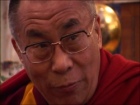 Dalai Lama
Dalai Lama
The Hypocrisy
Follow the story of the Dalai Lama's 30-year political campaign to destroy a centuries-old spiritual tradition taught to him by his own Spiritual Guide, and the efforts of those he's hurting to stop him:
Brief summary
- What is happening
- What is the Western Shugden Society (WSS)?
- Detailed reports of discrimination from inside India and elsewhere
The Dalai Lama's position
- A Great Deception
- Praise to Wisdom Buddha Dorje Shugden by the Dalai Lama
- In the Dalai Lama's words
Why is this happening?
- Why is this religious suppression taking place?
- Are the Dalai Lama's reasons valid?
Efforts to restore religious freedom
- Geshe Kelsang's open letter
- The ban is illegal and unconstitutional
- Press reports and videos
- Dorje Shugden Devotee's Charitable and Religious Society
- Dalai Lama sued for repressing religious freedom
- A conflict with a solution
- Announcement from Serpom Norling Monastery
Analysis of situation
- Sectarianism
- Can the Dalai Lama ever make a mistake?
- Is the Dalai Lama the only spiritual leader in Tibetan Buddhism?
- Theocracy or democracy?
- Spirit worship or authentic Buddhist practice?
- Freedom of worship
- The Dalai Lama's justifications
- Analysis by Dalai Lama's translator (PDF)
- What would Thomas Jefferson think of the 14th Dalai Lama?
- Book Reviews
- Videos
Evidence and first-hand accounts
- Chronological background
- Discord in exile documentary
- Political motivations for the ban
- Summary to date from Tibetan exiles
- Other
Ongoing persecution 2008-2010
- Recent vote sticks and call for help
- Forced signature and ID card campaign
- Persecution of monks at Sera Monasteries
- Public humiliation and explusion of monks
- Letter to Indian Prime Minister regarding abuses
- Letters from Dorje Shugden Devotees
- Urgent appeal from Sera Monasteries
- Support from Indian police
- Western Shugden Society letter to Sera monasteries
- Western Shugden Society letter to TGIE
- Heartfelt request from monks in Mundgod
- More discrimination planned around the world
- Letter from an FPMT monk
- Other
- What you can do